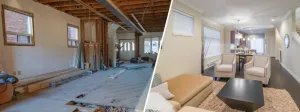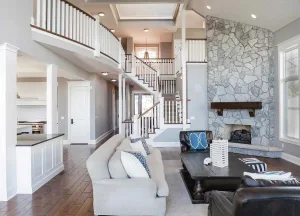Planning a whole-house renovation can be exciting but also overwhelming; especially when it comes to budgeting. Without a clear and realistic budget, costs can spiral out of control, turning your dream home into a financial headache.
Creating a solid budget helps you keep track of every expense, avoid surprises, and make smart choices. In this guide, you’ll learn how to plan a budget that fits your goals and keeps your renovation on track.
Understand Your Renovation Goals and Priorities

When it comes to how to create a realistic budget for your whole-house renovation, the very first step is to understand your renovation goals and priorities. For a successful NYC home renovation, this means knowing exactly what you want to change in your home and why. Without this clear picture, it’s easy to spend money on things that don’t really matter to you or miss out on what’s most important.
Define What You Want to Change
Start by thinking about the big picture. Are you renovating because you need more space, want to update an old kitchen, or improve your home’s energy efficiency? Maybe it’s a mix of all these things. Write down the rooms or features you want to focus on. When you know what you want to change, you can start to figure out how much it might cost and where your money should go.
Decide What Matters Most
Not all renovations are equal. Some updates will add more comfort or value to your home than others. Ask yourself what matters most. Is having a modern bathroom a priority? Or maybe a new roof? When you pick your top priorities, you can put more money into those areas and save on things that are less important. This way, your budget will match what you really want, not just what looks nice.
Set Realistic Expectations
It’s easy to get excited and want everything done at once, but setting realistic expectations helps keep your budget in check. Remember, a whole-house renovation can be big and expensive. Focus on what will make the biggest impact first. You can always plan to do smaller updates later.
Research Costs and Gather Accurate Estimates

When learning how to create a realistic budget for your whole-house renovation, one of the most important steps is to research costs and gather accurate estimates. Knowing how much things really cost will help you avoid surprises and keep your project on track.
Look Into Material Prices
Start by checking the prices of the materials you’ll need. Things like flooring, cabinets, paint, and fixtures can vary widely in price. Visit home improvement stores, browse online, or ask your contractor about current costs. This will give you a clear idea of what your materials might cost and help you choose options that fit your budget.
Get Quotes from Contractors
It’s smart to get several estimates from different contractors before you start. Each contractor may offer different prices based on their experience, the work quality, and how busy they are. Having multiple quotes helps you compare prices and understand the going rates for labor. Make sure these quotes cover all parts of the job to avoid hidden costs later.
Don’t Forget About Permits and Fees
Many renovations require permits from your city or county. These permits can come with fees that add up. Research what permits you might need and how much they cost. Including this in your budget now will stop you from getting caught off guard.
Plan for Unexpected Expenses
Even with careful research, unexpected costs can pop up. Materials might become more expensive, or repairs hidden behind walls might show up. Experts suggest adding about 10 to 20 percent extra to your budget to cover these surprises.
Create a Detailed Budget Spreadsheet
When you’re figuring out how to create a realistic budget for your whole-house renovation, putting all your costs into a detailed budget spreadsheet is a game changer. It helps you see where your money is going and keeps you organized throughout the project.
Break Down Your Costs
Start by dividing your renovation into clear categories. For example, separate materials like flooring and paint from labor costs such as contractors and electricians. Don’t forget to include permits, design fees, and even small expenses like cleaning supplies. Breaking your budget into these sections makes it easier to track and manage.
Add a Contingency Fund
Renovations almost always come with surprises. To prepare for this, add a contingency fund to your spreadsheet; usually about 10 to 20 percent of your total budget. This extra money will help cover unexpected costs without ruining your overall plan.
Track Expenses Regularly
Your budget isn’t just for planning; it’s a tool to use while the work is happening. Update your spreadsheet regularly as you pay bills and buy materials. This way, you’ll know right away if you’re going over budget or still have money to spend. Staying on top of your costs helps you avoid stress later.
Use Simple Tools
You don’t need fancy software to create a budget spreadsheet. A simple program like Excel or Google Sheets works perfectly. Set up columns for each category, the estimated cost, the actual cost, and notes. This keeps everything clear and easy to understand.
Tips for Sticking to Your Renovation Budget
Knowing how to create a realistic budget for your whole-house renovation is one thing; but sticking to it can be a whole different challenge. Renovations often come with unexpected costs and tempting upgrades, so having smart strategies can help you stay on track and avoid overspending.
Avoid Big Changes Mid-Project
One of the biggest reasons budgets blow up is because of last-minute changes. If you decide to add new features or switch materials halfway through, costs can quickly rise. Try to plan everything carefully before the renovation starts. If changes are necessary, think about whether they are worth the extra cost or if they can wait until later.
Focus on What Matters Most
Stick to your renovation goals and priorities. It’s easy to get distracted by trendy upgrades or fancy finishes, but these can add up fast. Spend money on the areas that will make the biggest difference to your home and daily life. Saving money on less important details means you can keep your budget balanced.
Communicate Clearly with Your Contractor
Good communication with your contractor is key to keeping costs down. Make sure you both understand what’s included in the budget and what isn’t. Ask for updates regularly and get any changes in writing. Clear communication helps avoid misunderstandings that could lead to unexpected bills.
Shop Smart and Compare Prices
Before buying materials or fixtures, shop around and compare prices. Sometimes, waiting for sales or choosing alternative products can save a lot without sacrificing quality. Being patient and doing your homework pays off in the long run.
Conclusion
Creating a realistic budget for your whole-house renovation is the key to a smooth and stress-free project. By setting clear goals, researching costs, and tracking expenses, you’ll build a plan that saves money and turns your vision into reality.
Information contained on this page is provided by an independent third-party content provider. Binary News Network and this Site make no warranties or representations in connection therewith. If you are affiliated with this page and would like it removed please contact [email protected]



Comments